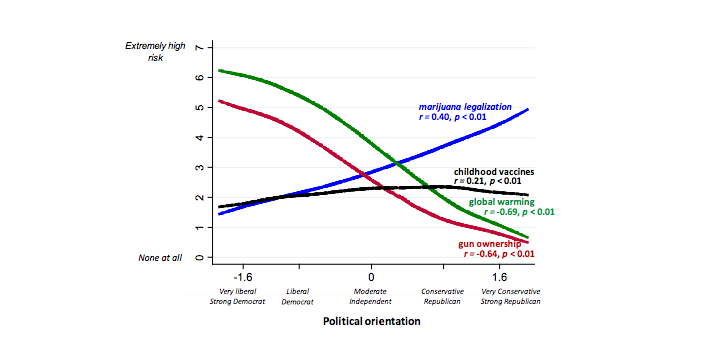Despite the scientific consensus that vaccines are responsible for wiping out a wide variety of infectious diseases in the U.S., the current measles outbreak has politicians on the left and right weighing in on whether parents should be able to choose whether or not they vaccinate their children. Given the recent statements from a number of possible 2016 election contenders, you would think that vaccines are a widely divisive political issue. But according to data, they’re not.
In 2014, Dan Kahan, the Elizabeth K. Dollard Professor of Law and professor of psychology at Yale Law School, surveyed 2,316 U.S. adults in order to assess public perceptions and attitudes about vaccines. He wanted to know whether the often repeated idea that the public is increasingly fearful of vaccines was true, and whether political parties were really split over vaccines’ risks and benefits. He found the answer was largely no.
Kahan’s data on vaccine-risk perception shows vaccines are one of the most agreed-upon topics regardless of political leaning. Compared with gun ownership, legalizing marijuana and global warming, vaccines are viewed as a generally low-risk by Americans across the political spectrum. And despite the stereotype that upper-class liberals are more likely to scorn vaccines, Kahan’s data, seen in the graph below, shows that people have slightly more negative assessments of vaccines as they become more conservative and identify more with the Republican Party. But the disparities are still really not that notable.

Ultimately, Kahan’s No. 1 finding was this: “There is deep and widespread public consensus, even among groups strongly divided on other issues such as climate change and evolution, that childhood vaccinations make an essential contribution to public health.”
Overall, the people who distrust vaccines and do not vaccinate their children are largely random individuals. Kahan writes:
There was a modest minority of respondents who held a negative orientation toward vaccines. These respondents, however, could not be characterized as belonging to any recognizable subgroup identified by demographic characteristics, religiosity, science comprehension, or political or cultural outlooks. Indeed, groups bitterly divided over other science issues, including climate change and human evolution, all saw vaccine risks as low and vaccine benefits as high. Even within those groups, in other words, individuals hostile to childhood vaccinations are outliers.
With over 100 cases in 14 states, however, those outliers can’t be ignored.
More Must-Reads from TIME
- Donald Trump Is TIME's 2024 Person of the Year
- Why We Chose Trump as Person of the Year
- Is Intermittent Fasting Good or Bad for You?
- The 100 Must-Read Books of 2024
- The 20 Best Christmas TV Episodes
- Column: If Optimism Feels Ridiculous Now, Try Hope
- The Future of Climate Action Is Trade Policy
- Merle Bombardieri Is Helping People Make the Baby Decision
Contact us at letters@time.com